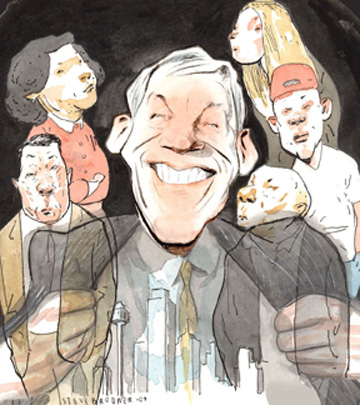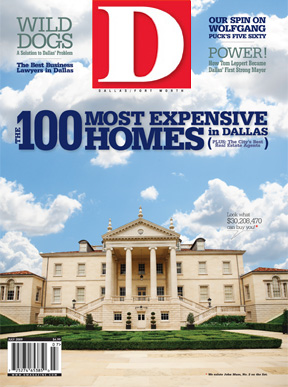Tonight could have been Phillip Jones’ night. Maybe it should have been. A year or so ago, before it all got so out of hand, before the personal attacks and the mudslinging and everything else, maybe it would have been. After all, the president and CEO of the Dallas Convention & Visitors Bureau stood to gain as much as anyone from the outcome of the May 9 vote. Proposition 1 would have immediately (and, after all the false starts over the years, probably forever) halted the progress of the new convention center hotel—the precious that Jones’ Gollum has been chasing forever. Yes, it could have been his.
At the “Vote No!” election night shindig at Gilley’s, Jones is certainly acting as though Proposition 1’s defeat is his victory. He awkwardly pumps his fist onstage in front of the crowd. Taking the microphone, he steps on his own creaky jokes, the loopy grin on his face trying too hard, as always. He’s the A/V Club president who has finally convinced the cool kids to come to his birthday party.
Except the truth is, everyone here munching on nachos and ignoring the inoffensive dance pop the DJ is spinning hasn’t come to Jones’ party at all. (Though you suspect this is the exact kind of party he would throw.) If they thought about it, they’d realize they aren’t here to celebrate the convention center hotel, either.
No, what they are here for is the inauguration of Dallas’ first strong mayor of the 14-1 era, Tom Leppert. Ron Kirk and Laura Miller may have been strong personalities, but—perhaps because their personalities were too strong—they weren’t able to set the city’s political agenda in the same way he has. Leppert does not have total authority and complete independence; it only feels that way. It doesn’t matter that he was elected two years ago and won’t be up for a second term for another two years. Whether you love or hate his politics—and based on the Proposition 1 results, the former camp has a slim lead at the moment—you have to admit: Leppert gets things done, in the same manner a strong mayor would. The convention center hotel fracas proved that if nothing else.
How Leppert got to this point is curious. When he was elected in 2007, some pundits felt the retired CEO of Turner Construction was merely a placeholder between two council-bred firebrands, Laura Miller and Angela Hunt. That was partially wishful thinking, since Leppert was such an unsexy choice for mayor, and the election—with its overcrowded ballot of candidates—had ended with a whimper instead of a bang, plagued by low turnouts and an anticlimactic runoff.
Though he had an impressive résumé in the business community, politically Leppert was an invisible man when he began his campaign for mayor in 2006. (How invisible? At one point in late 2006, his name recognition was found in polls to be equal to that of another lesser candidate: me.) His lack of brand identity worked both ways for him. On the one hand, it meant that Leppert didn’t come into office with the same kind of baggage Miller brought with her to the mayor’s office—or that most of his fellow mayoral candidate would have brought with them. He didn’t have to contend with people’s preconceived notions of him.
On the other hand, to twist a phrase, nature abhors a blank slate. Because he was handpicked to run by the Dallas Citizens Council and chose powerful consultant Carol Reed to help him do so, it was too easy to come up with a conspiracy theory. He was seen as a puppet, manufactured by the establishment and manipulated by powerful interests with secret agendas.
Even now, how much does anyone really know about him, beyond the fact that he has a preference for black pinstripe suits when making public appearances? We know, really, only this: “He treats the job like a CEO.” That was essentially the platform on which he ran, and that is the one-sentence scouting report on the first two years of his term. He’s always working, a 24/7/365 mayor who comes in early, leaves late, and is never really off the clock. But that’s it. Work ethic only fills in so many gaps.
As such, it’s tempting to be cynical about Leppert’s motives, to look at every decision with a jaundiced eye. But that’s the wrong way to go about it. This is not to suggest that everything he does is right: the convention center hotel may very well be an expensive albatross he just wrapped around the city’s neck, and his insistence on pressing forward with some riskier elements of the Trinity project—even in the face of scientific evidence saying that course of action is unwise—is hard to fathom. I’m just saying there’s not much of a conspiracy there.
I spent a few weeks asking around about Leppert, talking to his allies and rivals, and those assigned to cover both. No one would go on the record with his thoughts, but this portrait of Leppert could be attributed to any and all of them: he is a man who genuinely wants to give back, mainly as a way of showing thanks to the people who helped him up from meager beginnings. Does he think about running for a higher office? Probably, sometimes, but that’s not his goal. He is a walking embodiment of Occam’s razor. When it comes to explaining Leppert’s actions, the simplest explanation is probably the correct one.
Which brings us back to the convention center hotel and Leppert’s rise as a strong mayor. Though the project has been discussed and shelved numerous times over the years, Leppert got it done because he shepherded it through council (he doesn’t make a move unless he has the votes) and then took the heat when the trouble came. It became almost solely about him as soon as Leppert decided to put himself front and center in the debate. Why would he do that? Because he believed in the hotel, and he believed the business community and the city needed it. He might be wrong, but there it is. For many people, that explanation is too simple. There had to be something else at work. In a cover story on the eve of the election, the Dallas Observer claimed Proposition 1 was really a referendum on the mayor, a way to pass judgment on his two years in office.
The story was half right. The vote was about Leppert, but it wasn’t an assessment of his first two years. It was about what he’s free to do in the next two years. I hope everyone is comfortable with the first strong mayor of the 14-1 era, because you just elected him.
BANG FOR THE BUCK?
The massive amount spent on the convention center hotel vote (much of it by Harlan Crow) didn’t result in a rush to the ballot box.
TOTAL EXPENSE:
$5.8 million
TOTAL VOTES:
84,669
PERCENTAGE OF REGISTERED VOTERS IN DALLAS
16.14
Write to [email protected].





